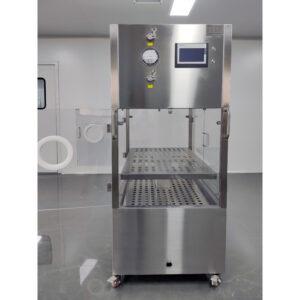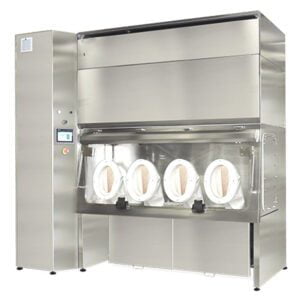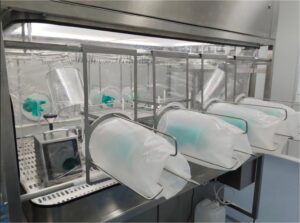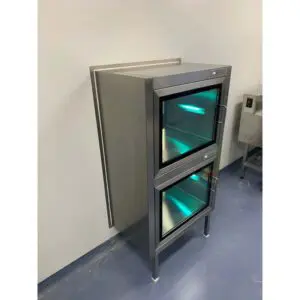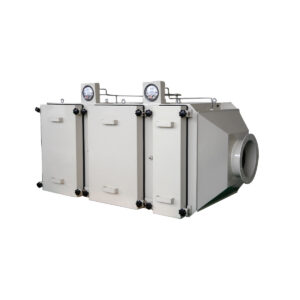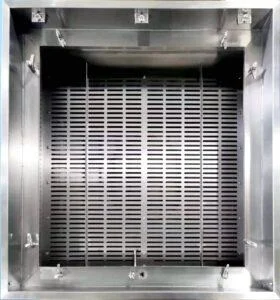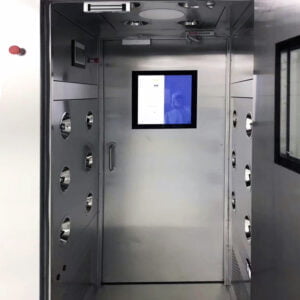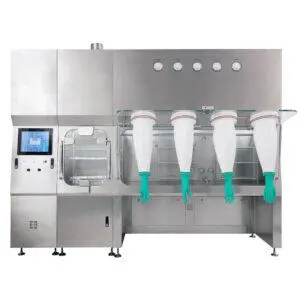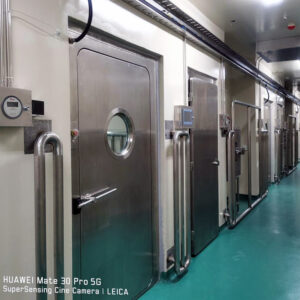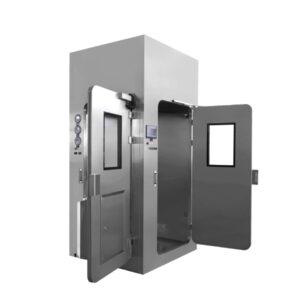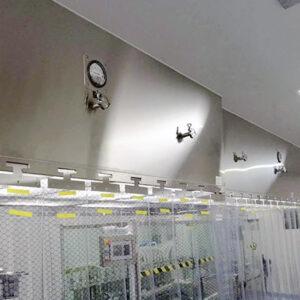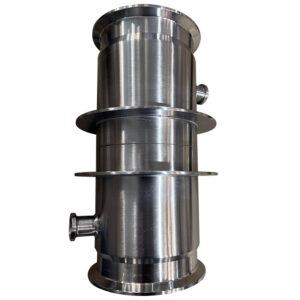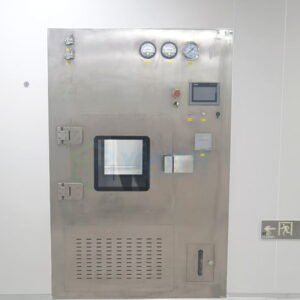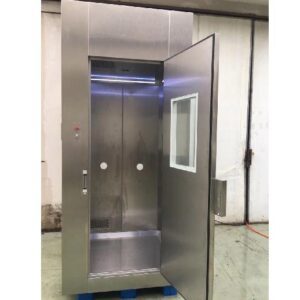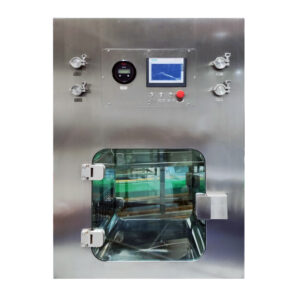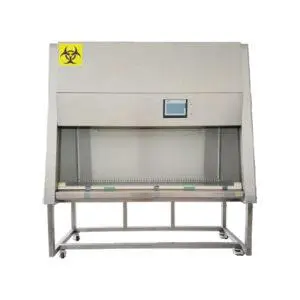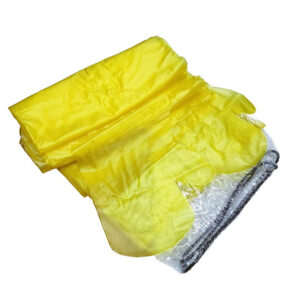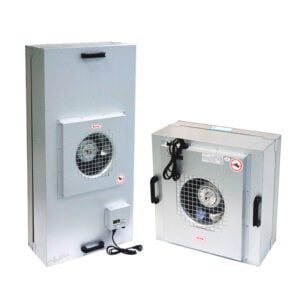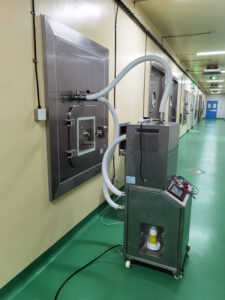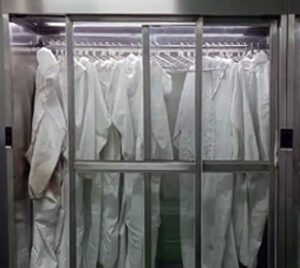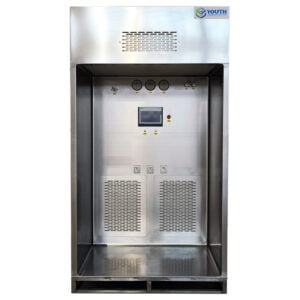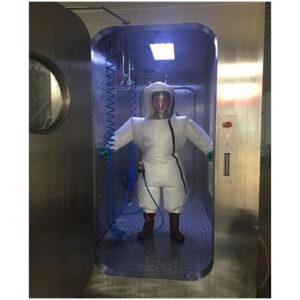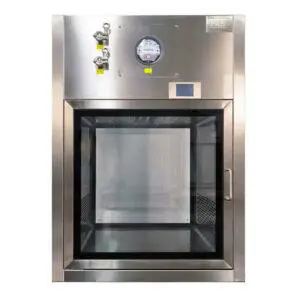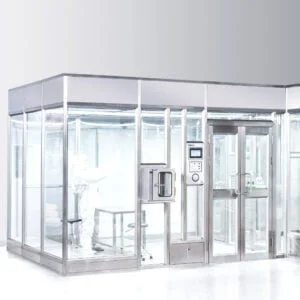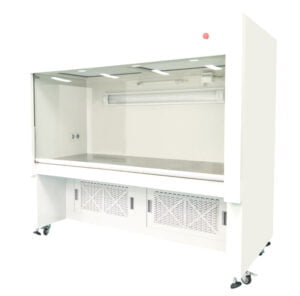The selection of BIBO manufacturers can make or break your facility’s containment strategy, yet many procurement teams struggle with evaluating these critical biosafety systems. With pharmaceutical and biotechnology industries facing increasingly stringent regulatory requirements, the stakes have never been higher for choosing the right bag-in-bag-out filtration partner.
Consider this: a single containment failure due to substandard BIBO equipment can result in facility shutdowns costing millions of dollars, not to mention potential health risks to personnel. Recent industry data shows that 67% of containment breaches stem from inadequate equipment selection or poor manufacturing quality, making manufacturer evaluation more crucial than ever.
This comprehensive guide will equip you with the technical knowledge, evaluation frameworks, and insider insights needed to identify top BIBO manufacturers, assess their quality standards, and make informed procurement decisions that protect both your operations and your bottom line. From understanding core technologies to comparing manufacturer capabilities, we’ll navigate the complex landscape of bag-in-bag-out systems to ensure your next investment delivers maximum value and safety.
What Are BIBO Systems and Why Do Manufacturers Matter?
Bag-in-bag-out (BIBO) systems represent the gold standard in containment filtration technology, designed to prevent cross-contamination during filter changes in critical environments. These sophisticated systems utilize a dual-bag mechanism that creates an isolated pathway for filter replacement, eliminating direct contact between contaminated and clean environments.
Understanding BIBO Technology Fundamentals
The core principle behind BIBO systems involves housing HEPA or ULPA filters within specially designed bags that can be safely removed and replaced without breaking containment. This technology proves essential in pharmaceutical manufacturing, nuclear facilities, and high-containment laboratories where even microscopic contamination poses significant risks.
Modern BIBO systems incorporate advanced features including differential pressure monitoring, bag inflation systems, and automated sealing mechanisms. Leading manufacturers have developed proprietary technologies that enhance these basic functions, with some systems achieving containment levels below 0.1 micrograms per cubic meter.
Why Manufacturer Selection Impacts Long-term Success
The choice of BIBO manufacturers directly influences system reliability, maintenance costs, and regulatory compliance. Quality manufacturers invest heavily in research and development, resulting in more robust designs that withstand demanding operational conditions. In our experience working with various containment systems, manufacturer reputation often correlates directly with system performance and longevity.
Poor manufacturer selection can lead to premature filter bag failures, inadequate sealing mechanisms, and costly downtime. Industry data indicates that systems from tier-one manufacturers demonstrate 40% fewer maintenance issues compared to lower-tier alternatives, translating to significant operational savings over time.
| Manufacturer Tier | Average System Uptime | Maintenance Frequency | Regulatory Compliance Rate |
|---|---|---|---|
| Tier 1 | 99.7% | Quarterly | 99.8% |
| Tier 2 | 98.9% | Bi-monthly | 97.2% |
| Tier 3 | 96.4% | Monthly | 94.5% |
How to Evaluate the Quality of BIBO Manufacturers?
Assessing BIBO manufacturers requires a systematic approach that examines technical capabilities, quality systems, and market reputation. The evaluation process should encompass both quantitative metrics and qualitative factors that impact long-term performance.
Technical Certification and Standards Compliance
Top-tier BIBO manufacturers maintain certifications from recognized standards organizations including ISO 9001, ISO 14644, and NSF. These certifications indicate adherence to quality management systems and cleanroom standards essential for pharmaceutical and biotechnology applications.
Regulatory compliance extends beyond basic certifications to include FDA validation support, European GMP compliance, and specialized certifications for nuclear applications. Leading manufacturers provide comprehensive documentation packages that streamline regulatory approval processes for end users.
Manufacturing Excellence Indicators
Quality assessment should examine manufacturing processes, quality control procedures, and testing protocols. Elite manufacturers utilize advanced manufacturing techniques including precision welding, automated assembly, and comprehensive leak testing for every unit produced.
According to recent industry analysis, manufacturers with Six Sigma quality programs demonstrate 85% fewer field failures compared to those without formal quality systems. This data underscores the importance of evaluating manufacturer quality processes during selection.
Customer Support and Service Capabilities
Manufacturer evaluation must consider post-installation support, including technical assistance, spare parts availability, and maintenance services. As one industry expert notes, “The best BIBO system is only as good as the support behind it – complex containment equipment requires ongoing expertise to maintain optimal performance.”
Leading companies provide 24/7 technical support, comprehensive maintenance training, and predictive maintenance programs. These services prove particularly valuable in mission-critical applications where system downtime is unacceptable.
What Makes Leading BIBO Companies Stand Out in the Market?
Distinguished BIBO manufacturers separate themselves through innovation, reliability, and comprehensive solution portfolios. Understanding these differentiating factors helps identify manufacturers capable of delivering superior long-term value.
Innovation in Containment Technology
Market leaders invest 8-12% of revenue in research and development, resulting in breakthrough technologies that enhance system performance. Recent innovations include smart monitoring systems, automated bag change mechanisms, and advanced filtration media that extend operational life.
YOUTH Clean Tech exemplifies this innovation approach, developing proprietary sealing technologies that achieve superior containment levels while simplifying maintenance procedures. Their systems incorporate real-time monitoring capabilities that provide predictive maintenance insights.
Global Manufacturing and Support Infrastructure
Top BIBO companies maintain manufacturing facilities in multiple regions, ensuring supply chain resilience and local support capabilities. This geographic diversification becomes crucial for multinational pharmaceutical companies requiring consistent equipment specifications across global facilities.
Customization Capabilities and Engineering Expertise
Leading manufacturers offer extensive customization options to address unique application requirements. This flexibility includes modified housing configurations, specialized filtration media, and integrated monitoring systems tailored to specific operational needs.
Engineering expertise enables these companies to provide comprehensive consultation services, helping customers optimize system specifications for their particular applications. Industry data shows that properly specified custom systems demonstrate 30% better performance compared to standard configurations in specialized applications.
| Customization Factor | Impact on Performance | Cost Premium | Implementation Time |
|---|---|---|---|
| Modified Housing | 15-25% improvement | 10-20% | 2-4 weeks |
| Specialized Media | 20-35% improvement | 15-30% | 3-6 weeks |
| Integrated Monitoring | 25-40% improvement | 20-35% | 4-8 weeks |
Which Technical Specifications Should You Consider When Choosing BIBO Manufacturers?
Technical specifications form the foundation of effective BIBO manufacturer evaluation, encompassing filtration performance, containment capabilities, and operational parameters that directly impact system effectiveness.
Filtration Efficiency and Containment Performance
Primary technical considerations include HEPA/ULPA filtration efficiency ratings, typically ranging from 99.97% to 99.9995% for particles 0.3 microns and larger. However, containment performance extends beyond basic filtration efficiency to include bag sealing integrity and housing leak rates.
Elite manufacturers achieve containment levels below 0.05 micrograms per cubic meter through advanced sealing technologies and precision manufacturing processes. These performance levels prove essential in high-potency pharmaceutical manufacturing and nuclear applications where even trace contamination is unacceptable.
Airflow Capacity and Pressure Drop Characteristics
System airflow capacity must align with facility ventilation requirements while maintaining acceptable pressure drop levels. Most BIBO systems handle airflows between 500-4000 CFM, with pressure drops typically ranging from 1.5-3.0 inches water gauge when equipped with clean filters.
Manufacturers provide detailed performance curves showing airflow versus pressure drop characteristics, enabling proper system sizing for specific applications. It’s worth noting that oversized systems may not provide optimal containment performance, while undersized units create excessive pressure drops that strain facility HVAC systems.
Construction Materials and Durability Factors
Material selection significantly impacts system longevity and maintenance requirements. Premium manufacturers utilize 316L stainless steel for wetted surfaces, ensuring compatibility with aggressive decontamination agents used in pharmaceutical facilities.
Gasket materials, bag attachment mechanisms, and filter housing seals require careful evaluation for chemical compatibility and operational life. Leading systems incorporate fluoropolymer seals and specialized gasket compounds that maintain integrity through thousands of operating cycles.
How Do Top BIBO Manufacturers Ensure Compliance and Safety Standards?
Regulatory compliance represents a critical differentiation factor among BIBO manufacturers, with leading companies maintaining comprehensive quality systems that meet international pharmaceutical and nuclear industry standards.
Quality Management Systems and Documentation
Top-tier manufacturers implement ISO 9001 quality management systems with specialized procedures for cleanroom equipment manufacturing. These systems encompass design controls, manufacturing processes, testing protocols, and document management procedures that ensure consistent product quality.
Documentation packages from leading manufacturers include detailed specifications, test certificates, installation guidelines, and validation support materials. This comprehensive documentation streamlines regulatory approval processes and supports customer validation activities.
Validation Support and Regulatory Expertise
Elite BIBO companies provide extensive validation support including Installation Qualification (IQ), Operational Qualification (OQ), and Performance Qualification (PQ) protocols. This support proves invaluable for pharmaceutical customers operating under FDA or European Medicines Agency oversight.
According to industry research, customers working with manufacturers providing comprehensive validation support complete regulatory approval processes 45% faster compared to those receiving minimal documentation support. This time savings translates to significant project cost reductions and faster facility startup.
International Standards Compliance
Leading manufacturers maintain compliance with multiple international standards including ASME AG-1 for nuclear applications, NSF/ANSI standards for pharmaceutical use, and European EN standards for general containment applications.
While comprehensive standards compliance increases initial equipment costs by 15-25%, the long-term benefits include reduced regulatory risk, easier facility audits, and improved system reliability. As one regulatory expert observes, “Investing in compliant equipment costs more upfront but saves significant expense and headaches during regulatory inspections.”
What Are the Cost Considerations When Selecting BIBO Manufacturers?
Cost evaluation for BIBO manufacturers extends beyond initial purchase price to encompass total cost of ownership, including maintenance expenses, operational costs, and productivity impacts over the system lifecycle.
Initial Capital Investment Analysis
BIBO system costs vary significantly based on size, customization level, and manufacturer tier. Standard systems typically range from $15,000-$75,000, while highly customized units can exceed $150,000. However, initial price comparisons can be misleading without considering long-term operational costs.
Premium manufacturers often command 20-30% price premiums compared to economy alternatives, but this investment typically pays dividends through reduced maintenance costs and improved reliability. Industry data suggests that total cost of ownership over 10 years favors premium systems in most applications.
Operational and Maintenance Cost Factors
Ongoing costs include filter replacement, maintenance labor, and system downtime impacts. Quality manufacturers design systems for simplified maintenance, reducing labor requirements and minimizing downtime during service activities.
Filter bag costs vary among manufacturers, with proprietary designs sometimes commanding premium pricing. However, this cost differential may be offset by extended service life or improved containment performance that reduces overall operational risk.
Lifecycle Value Comparison Framework
Total cost of ownership analysis should consider system useful life, typically 15-20 years for quality BIBO equipment. Leading manufacturers provide lifecycle cost models that help customers understand long-term financial implications of different options.
| Cost Component | Premium Manufacturer | Economy Option |
|---|---|---|
| Initial Cost | $50,000 | $35,000 |
| Annual Maintenance | $3,500 | $5,200 |
| Filter Costs (Annual) | $2,800 | $3,400 |
| 10-Year Total Cost | $113,000 | $121,000 |
How to Compare Different BIBO Manufacturer Options Effectively?
Systematic comparison of top BIBO manufacturers requires structured evaluation frameworks that weight technical capabilities, commercial factors, and strategic considerations according to your specific application requirements.
Developing Weighted Evaluation Criteria
Effective manufacturer comparison begins with establishing weighted evaluation criteria reflecting your operational priorities. Technical performance typically receives 40-50% weighting, while commercial factors and support capabilities account for the remaining evaluation points.
Criteria should include quantitative metrics such as filtration efficiency, containment performance, and cost factors, balanced with qualitative assessments of manufacturer reputation, support capabilities, and innovation track record.
Reference Project Analysis
Evaluating manufacturer performance on similar projects provides valuable insights into real-world capabilities. Request detailed case studies including project scope, performance results, and customer satisfaction metrics for installations comparable to your requirements.
Leading manufacturers willingly provide reference contacts and detailed project histories, while less established companies may have limited reference portfolios. In our experience, manufacturers hesitant to provide references often have performance issues they prefer to avoid discussing.
Long-term Partnership Considerations
BIBO system relationships extend well beyond initial installation, making manufacturer partnership capabilities crucial evaluation factors. Consider manufacturer financial stability, technology roadmaps, and commitment to your specific market segment.
The best manufacturer partnerships evolve into strategic relationships where suppliers provide ongoing consultation, technology updates, and operational optimization support. These relationships prove particularly valuable as regulations evolve and operational requirements change over time.
Selecting the right BIBO manufacturer requires balancing technical excellence, commercial viability, and strategic partnership potential. While the evaluation process may seem complex, investing time in thorough manufacturer assessment pays significant dividends through improved system performance, reduced operational risk, and enhanced regulatory compliance.
The most successful BIBO installations result from partnerships with manufacturers who combine technical innovation, quality manufacturing, and comprehensive support services. As containment requirements continue evolving, working with forward-thinking manufacturers ensures your investment will meet both current needs and future challenges.
Ready to explore advanced BIBO filtration solutions that deliver superior containment performance and long-term value? The right manufacturer partnership can transform your facility’s containment capabilities while providing the peace of mind that comes with proven expertise and reliable support.
Frequently Asked Questions
Q: What are BIBO systems, and why are they important for industrial applications?
A: BIBO—short for “Bag-In, Bag-Out”—systems are specialized containment solutions designed to safely handle, replace, and dispose of filters in environments where exposure to hazardous materials must be prevented. Selecting top BIBO manufacturers is critical because these systems are widely used in pharmaceuticals, biotechnology, nuclear, and chemical industries, where maintaining sterile conditions and operator safety is non-negotiable. High-quality BIBO systems minimize contamination risks during filter changes and help facilities comply with stringent regulatory standards.
Q: What criteria should I use to assess the quality of top BIBO manufacturers?
A: When evaluating top BIBO manufacturers for your quality assessment guide, focus on these key criteria:
- Material Selection: Look for manufacturers that use corrosion-resistant materials like 316L stainless steel or specialized alloys, chosen through rigorous chemical compatibility analysis.
- Construction Standards: Full penetration welds and industry-leading sealing systems (e.g., EPDM, Viton, silicone) indicate a commitment to durability and leak prevention.
- Testing Protocols: Reliable BIBO suppliers conduct comprehensive testing, including DOP efficiency tests (99.97% or higher), cyclic pressure testing, and thermal cycling.
- Documentation and Compliance: Top manufacturers provide detailed technical manuals, validation reports, and up-to-date certifications (e.g., ASME AG-1, FDA cGMP) to ensure regulatory compliance.
- Supplier Audits: On-site assessments of manufacturing processes, quality control, and technical capabilities further distinguish leading BIBO system providers.
Q: How do top BIBO manufacturers ensure compliance with industry regulations?
A: Leading BIBO manufacturers design their systems to exceed regulatory requirements set by agencies like OSHA, EPA, and the CDC. Key compliance strategies include:
- Standardized Processes: Documented, repeatable procedures for filter changes ensure traceability and consistency.
- Safety Features: Components like housing seals, bag-in/bag-out ports, and safety locks are rigorously tested to prevent contamination and exposure.
- Validation and Testing: Manufacturers validate critical manufacturing steps, perform regular integrity tests, and maintain comprehensive quality records.
- Training and Documentation: Facilities invest in personnel training and maintain meticulous documentation to support audits and inspections.
Q: What advanced features should I look for when choosing among top BIBO manufacturers?
A: Beyond basic compliance, top BIBO manufacturers differentiate themselves with advanced features:
- Customization: Ability to tailor systems for specific applications, environments, or hazardous materials.
- Seismic and Thermal Qualification: Systems tested for extreme conditions, ensuring reliability in challenging operational environments.
- Electronic Documentation: Use of compliant electronic systems for full traceability, change management, and audit readiness.
- Proactive Maintenance Support: Manufacturers offering predictive maintenance programs and real-time performance monitoring help reduce downtime and extend system life.
Q: How do supplier audits contribute to selecting the right BIBO manufacturer?
A: Supplier audits are essential for verifying that a BIBO manufacturer’s claims match their actual capabilities. During an audit, assess:
- Facility Conditions: Cleanliness, equipment calibration, and environmental controls.
- Quality Systems: Robust documentation, change management, and data integrity practices.
- Testing Capabilities: In-house laboratories, validated testing methods, and the ability to perform witness testing.
- Performance History: Statistical analysis of past performance data to identify trends and process improvements.
These audits help ensure you partner with a manufacturer that delivers consistent quality, technical expertise, and long-term reliability.
Q: What are the long-term benefits of choosing a top BIBO manufacturer for my facility?
A: Partnering with a top BIBO manufacturer offers several long-term advantages:
- Reduced Maintenance Costs: High-quality construction and rigorous testing mean fewer failures and lower repair expenses.
- Regulatory Confidence: Comprehensive documentation and industry certifications simplify compliance and audit processes.
- Enhanced Safety: Advanced safety features and reliable containment reduce the risk of exposure for personnel.
- Operational Efficiency: Standardized, well-documented processes streamline maintenance and minimize downtime.
- Scalability: Leading manufacturers often provide scalable solutions, allowing facilities to expand or adapt systems as needs evolve.
Investing in a top BIBO manufacturer is an investment in safety, compliance, and operational excellence.
External Resources
- BIBO Manufacturer Evaluation | Quality Assessment Criteria – This detailed guide explains critical criteria for selecting top BIBO manufacturers, including material standards, testing protocols, and regulatory compliance for quality assessment.
- BIBO Supplier Selection Guide | Vendor Qualification Process – This resource outlines step-by-step procedures for evaluating BIBO suppliers, covering supplier audits, documentation review, and performance testing crucial for quality assurance.
- Maintaining BIBO Filter Housings: Best Practices for Optimal Performance – Offers expert insights on maintaining BIBO filter housings and highlights the importance of quality-focused manufacturers for long-term system reliability.
- How to Ensure BIM Quality Assurance and Validation: Best Practices – While focused on BIM, this guide discusses quality assurance practices and validation principles that can inform assessments of manufacturers’ quality processes.
- Understanding BIBO Filtration Systems for Industrial Applications – Presents an overview of BIBO system functions, emphasizing the importance of quality manufacturing and assessment for industrial air filtration.
- Selecting Safe Containment: A BIBO Filter Guide for Labs – Reviews key factors for evaluating and selecting high-quality BIBO filter manufacturers, with emphasis on laboratory safety and compliance standards.
Related Contents:
- Bag In Bag Out Systems | Safety Fundamentals Explained
- Understanding BIBO | Hazardous Material Containment
- Top 5 BIBO Containment Solutions for 2025
- BIBO System Regulations: Compliance Guide 2025
- BIBO Safety Certifications: What You Need to Know
- Best Biosafety Equipment Manufacturers | Evaluation Criteria | Quality Assessment
- Safe Chemical Handling with BIBO Systems
- BIBO vs. Traditional Containment: Which is Better?
- Best BIBO Suppliers | Vendor Selection & Evaluation


